SUPPORT OUR JOURNALISM: Please consider donating to keep our website running and free for all - thank you!
- Meet the team
- Privacy Policy
- Royal Weddings
- Media & Commentary requests


Milestones of a Monarch: The Queen’s historic visit to West Germany
While she has made countless milestones and memories over her 70-year reign, Royal Central is taking a look back at Her Majesty’s historic 1965 visit to West Germany in honour of the Platinum Jubilee.
Her Majesty The Queen and her husband, the Duke of Edinburgh paid a state visit as the climax of a political reconciliation that had been pushed hard by both the British and German governments. The push came after former Prime Minister Harold Macmillan and leading Weimar Republic politician, Dr Konrad Adenaue,r retired from their leadership positions within their respective governments in the year prior.
Over the previous two years, a government decision favouring the visit had been rumored but nothing had actually happened. Macmillan reportedly advised against a visit while he was in office. It’s believed he thought the visit would be highly controversial in the UK. Since the end of World War II, anti-German feelings had been lingering throughout Britain but over time, became less harsh than they were immediately after the war.
The 10-day visit to the Federal Republic of Germany (or West Germany) would mark the first official visit by a British sovereign since King George V visited in 1913 to attend the wedding of Princess Victoria of Prussia. The visit would mark the 20-year anniversary of the end of World War II and help to symbolize the reconciliation between the two countries. It also helped recognise Germany’s efforts to reemerge as a power in Europe.
The visit was deemed extremely successful. President Heinrich Lübke and the German people extended warm welcomes as Her Majesty and the Duke toured the country. Traveling a majority of the time by special train, stops on the tour included a performance at the Schiller National Museum in Marbach. There, The Queen listened to performance alongside German Prime Minister Kurt Georg Kiesinger. She also took a cruise on the Rhine, on a route traveled by her great-great-grandmother, Queen Victoria.
Her Majesty would not make a state visit to West Germany again until May 1978.
Share this:
About author
Sydney zatz, latest posts, what to expect from the japanese state visit to the uk, horses injured in an april london bolt likely to take part in trooping the colour, special visits from royals mark sweden's national day, royal families pay tribute to fallen at d-day commemorations, never miss the latest, most popular, the queen watches on with pride as lady louise drives prince philip’s carriages at windsor horse show, an annus horribilis in monaco a difficult year for albert and charlene finally winds to an end, the duchess of cambridge wows tv audiences with a musical piano performance on christmas eve, latest blogs.
Romantic wedding gifts that became one royal family's most famous tiaras
A rainbow of royal wedding bouquets
The dramatic story of a tiara worn by the most historic monarch of all
- History Classics
- Your Profile
- Find History on Facebook (Opens in a new window)
- Find History on Twitter (Opens in a new window)
- Find History on YouTube (Opens in a new window)
- Find History on Instagram (Opens in a new window)
- Find History on TikTok (Opens in a new window)
- This Day In History
- History Podcasts
- History Vault
Queen Elizabeth II: 15 Key Moments in Her Reign
By: Sarah Pruitt
Updated: July 25, 2023 | Original: November 12, 2020

Queen Elizabeth II , who ruled the United Kingdom for seven decades, was such a longstanding institution that it’s easy to forget she wasn’t supposed to have become queen at all.
Born in 1926, Elizabeth was the daughter of King George V ’s second son, and had little expectation of succeeding to the throne until her uncle, King Edward VIII , abdicated in 1936 to marry the divorced American socialite Wallis Simpson. After the death of her father , King George VI , 25-year-old Elizabeth was called upon to assume the throne, beginning a momentous reign. In February 2022, the United Kingdom staged a series of celebrations for the queen's Platinum Jubilee —marking 70 years of her service to the British Commonwealth.
Queen Elizabeth II, who died at age 96, proved consistent and enduring. In April 2021, she lost her husband of 73 years, Prince Phillip , when he died at age 99. In February 2022, the Queen contracted the coronavirus, which she later said left her "very tired and exhausted." She installed her 15th prime minister. Liz Truss, just two days before her death.
1. Queen Elizabeth II's Coronation - June 2, 1953

Held at Westminster Abbey, Elizabeth’s coronation ceremony was the first to be broadcast live on television. Some 27 million people in the United Kingdom (out of a total population of 36 million) watched the ceremony , and 11 million more listened on the radio. Afterward, some 3 million people lined the route as the queen and her entourage made their slow procession back to Buckingham Palace.
2. First State Visit to West Germany - 1965

In the midst of a decade marked by social and political changes , the queen kept to a busy schedule of diplomatic duties, including a 10-day visit to the Federal Republic of Germany (or West Germany) that was the first official visit there by a British royal since 1913. Her visit marked the 20-year anniversary of the end of World War II , helping to symbolize the reconciliation between the two countries and recognize Germany’s re-emergence as a power in Europe and on the world stage.
3. Mining Disaster in Wales - 1966

On October 21, 1966, an avalanche of mud, water and debris from a coal mine buried an elementary school in the South Wales village of Aberfan, killing 116 children and 28 adults. Though Prince Philip arrived in Aberfan a day after the disaster, the queen herself delayed her visit for over a week, fearing her presence would distract from rescue and recovery efforts. Some of those close to Elizabeth—including her former private secretary, Lord Charteris—have said she regretted the decision not to visit Aberfan sooner .
4. First 'Walkabout' - 1970

During a royal tour of Australia and New Zealand with Philip and Princess Anne in 1970, Elizabeth bucked centuries of royal tradition when she took a casual stroll to greet crowds of people in person, rather than wave to them from a protected distance. Now a regular practice for British royals both abroad and at home, the first “walkabout” in Sydney was proposed by Sir William Heseltine, an Australian who served as the queen’s private secretary and was the driving force behind a 1969 TV documentary featuring the royal family, which attracted a global audience of some 40 million people.
5. Silver Jubilee - 1977

On June 7, Elizabeth and Philip rode in the Gold State Coach from Buckingham Palace to St. Paul’s Cathedral to officially celebrate her 25th year on the throne. Wearing a bright pink outfit, including a hat decked out with 25 fabric bells, the queen repeated her long-ago pledge to devote her life to service, saying that "Although that vow was made in my salad days when I was green in judgement, I do not regret nor retract one word of it.”
6. Prince Charles' Wedding to Lady Diana Spencer - 1981

On July 29, 1981, an estimated 750 million people in 74 countries around the world tuned in to watch Prince Charles, Elizabeth’s eldest son, marry Lady Diana Spencer, at St. Paul’s Cathedral. The romance between the heir to the British throne and the young “Shy Di” had attracted massive media attention, and their lavish nuptials were considered the “wedding of the century.” But while Diana earned the adoration of the public, her marriage to Charles (and her relationship with the royal family) was troubled from the beginning .
7. Visit to China - 1986

In late 1984, Prime Minister Margaret Thatcher ’s government agreed to return sovereignty over Hong Kong to China beginning July 1, 1997. In 1986, Elizabeth became the first British monarch to visit the Chinese mainland, touring the terracotta warriors in Xi’an, the Great Wall in Beijing and other sites. For the press, the diplomatic importance of the queen’s visit was outweighed by her husband’s characteristic (and sometimes racist) gaffes: Philip called Beijing “ghastly” and told a group of British students they would get “slitty eyes” if they stayed in China too long.
8. 'Annus Horribilis' - 1992
Charles and Diana’s marriage continued to deteriorate, and in 1992 they announced their decision to separate. Prince Andrew, the queen’s second son, and his wife, Sarah Ferguson, also separated, while Anne divorced her husband, Mark Phillips. Late that year, a fire broke out in Windsor Castle, destroying more than 100 rooms. In a speech delivered to mark the 40th anniversary of her succession, Queen Elizabeth remarked that 1992 “has turned out to be an 'Annus Horribilis'”: Latin for “a horrible year.”
9. Response to Princess Diana’s death - 1997

Public criticism of the royal family grew more intense after Charles and Diana’s divorce in 1996 and especially after Diana’s death in a car crash in Paris the following summer. The queen initially remained at her estate in Balmoral, Scotland, and refused to allow the flag to fly at half-mast over Buckingham Palace or address the grieving nation.
At the urging of her advisers, she soon revised her stance on the flag, returned to London to greet crowds of mourners and delivered a rare televised address to a nation devastated by the loss of the “People’s Princess.”
10. Golden Jubilee - 2002

The queen’s celebration of her 50th year on the throne was marred by a double loss, when her younger sister, Princess Margaret , and their mother died within weeks of each other. As the first British monarch since Queen Victoria to celebrate a Golden Jubilee, Elizabeth traveled more than 40,000 miles that year , including visits to the Caribbean, Australia, New Zealand and Canada. She also visited 70 cities and towns in 50 counties in the United Kingdom.
Compared with the tumultuous 1990s, the start of Elizabeth’s second half-century as queen coincided with the beginning of more positive relations between Britain and its royal family: In 2005, a majority of the British public supported Charles’ wedding to his longtime love, Camilla Parker-Bowles.
11. Visit to the Republic of Ireland - 2011

In May 2011, Elizabeth and Philip visited the Republic of Ireland at the invitation of President Mary McAleese. Though the queen had frequently visited Northern Ireland over the course of her reign, this was her first to the Republic of Ireland, and the first by a British monarch in 100 years. Elizabeth’s visit, during which she expressed her “sincere thoughts and deep sympathy” for the victims of the troubled Anglo-Irish past , was widely celebrated as the beginning of a new era of friendship.
12. Birth of Prince George - 2013

In July 2013, the queen welcomed a new great-grandson , Prince George Alexander Louis of Cambridge, the first child of Prince William and the former Kate Middleton, who married in 2011. Second in the line of succession after his father, George is widely expected to become king one day. His birth marked the first time since Victoria’s reign that three generations of direct heirs to the British throne were alive at the same time.
13. Prince Harry & Meghan Markle’s wedding - 2018

Perhaps no other event during Elizabeth’s reign symbolized the modernizing monarchy more than the wedding of Prince Harry to Meghan Markle, a divorced, biracial American actress. Though the queen reportedly gave her quick approval to the match, the relationship between the couple and the British media—as well as the rest of the royal family— grew increasingly tense after their marriage. In 2020, the Duke and Duchess of Sussex announced they were stepping back from their role as senior royals. They later moved to Markle’s native Southern California. Their son, Archie, was born in 2019, followed by their daughter Lilibet in 2021.
14. Prince Philip's death - 2021

On April 9, 2021, Prince Philip, Elizabeth's husband of 73 years, died at the age of 99 . The British monarchy’s longest-running love story began just before World War II, when 18-year-old Prince Philip of Greece met his third cousin, Princess Elizabeth, during her family’s visit to the Britannia Royal Naval College at Dartmouth, where Philip was studying. On November 14, 1947, the couple were married in Westminster Abbey, and King George VI named Philip as Duke of Edinburgh shortly after that.
For more than a half-century, Prince Philip supported his wife in her royal duties and took on an ambitious slate of obligations of his own. Philip's funeral was held on April 17, 2021. Because of coronavirus restrictions, only 30 guests were invited to attend. Photos of the queen sitting alone in St. George's Chapel struck many as a symbol of her loneliness and grief.
15. Platinum Jubilee - 2022

In February of 2022, England began a series of celebrations marking Queen Elizabeth II's 70 years on the throne. On June 2, a military parade featuring 1,400 troops in bearskin caps, musicians and 240 horses, a Royal Air Force flyover and an 82-gun salute were staged to honor the 96-year-old monarch, whose birthday was on April 21. One section of London even featured a parade of corgis (Elizabeth's favorite dog breed), with more than 30 of the short-legged canines "marching" in a procession.
The queen watched the pageantry from the balcony of Buckingham Palace and was joined by four generations of her heirs, including her eldest son, Prince Charles ; his eldest son, Prince William; and William’s eldest son, Prince George. Despite her age and having just sustained a case of COVID-19, the Queen, dressed in pearls and a light blue dress, coat and hat, wore a broad grin.

HISTORY Vault: Profiles: Queen Elizabeth II
Chart the unexpected rise and record-breaking reign of Queen Elizabeth II, which unfolded in the turbulent modern history of the English monarchy.

Sign up for Inside History
Get HISTORY’s most fascinating stories delivered to your inbox three times a week.
By submitting your information, you agree to receive emails from HISTORY and A+E Networks. You can opt out at any time. You must be 16 years or older and a resident of the United States.
More details : Privacy Notice | Terms of Use | Contact Us
Don’t Miss a Single Sparkling Moment! Sign up for The Court Jeweller Newsletter
The Court Jeweller
Sparkling Royal Jewels From Around the World
Jewel History: Queen Fever Hits Germany (1965)
07.20.2017 by The Court Jeweller // Leave a Comment
BONN — A wave of “Queen fever” is sweeping West Germany amid frantic preparations for Queen Elizabeth’s state visit in two weeks’ time. West Germans are rehearsing salutes, repairing roads, painting buildings, turning out Union Jacks and brushing up etiquette with an enthusiasm to match their national thoroughness.
When the Queen [1] arrives with Prince Philip [2] for her 10-day visit, she may receive the most tremendous welcome this young state has ever given a foreign visitor. The accompanying press corps — about 300 strong — is half as large again as that which covered the historic visits of presidents Kennedy and de Gaulle.
For weeks newspapers, magazines and television have been making sure that the public knows all about the British monarchy, the Queen’s life, her likes and dislikes, her family and, inevitably, the “truth” about her “as she really is.”
A public opinion poll has announced she is immensely popular with West Germans. Two out of three said they liked her — an unusually large number for a public figure. Only six percent were against her and the rest were indifferent.
A wave of nostalgia has swept over this sober 15-year-old republic for the vanished courts and royal houses of Germany. The prospect of unfamiliar royal protocol has produced a flutter of anxiety — particularly among women — about what to do, wear and say, if they are confronted with the Queen.
Newspapers and dancing teachers have been giving instructions on etiquette: do not speak until spoken to, address her as “Your Majesty,” curtsy if you wish, but on no account kiss the Queen’s hand. Dancing schools have been demonstrating the intricacies of the “court curtsy” and clothes rental firms report that “tails” are now almost impossible to come by.
Planners of the visit have worked hard to overcome the lack of a real national capital. for the main reception the government is borrowing the magnificent 18th century castle of Bruhl [3], between here and Cologne.
In Bonn, the federal capital, only the Petersburg hotel overlooking the Rhine was found suitable for the royal suite. From here the Queen will see the river illuminated by a gigantic fireworks display. During her tour of 10 German cities, the Queen will sleep in the special royal train which will carry her most of the time.
1. Queen Elizabeth II of the United Kingdom (born 1926) is the current sovereign of the United Kingdom and the Commonwealth realms. She’s the only living head of state who served in World War II. This state visit, which took place in West Germany and West Berlin, was the Queen’s first official visit to the country. It took place in the midst of the Cold War, not even two decades after the end of World War II. She also visited West Germany in 1978 and 1987; after unification, she made visits to Germany in 1990, 1992, 2004, and 2015.
2. Prince Philip, Duke of Edinburgh (born 1921) has been married to Queen Elizabeth II for nearly seven decades. Although he was the son of a Greek prince and a German princess, Philip served in the Royal Navy during World War II. He was mentioned in despatches for his valor during the Battle of Cape Matapan. Philip’s relationship with Germany was complicated. He was educated for a time in Baden-Württemberg, a large part of his mother’s family came from Germany, and all of his sisters married German princes.
These relationships led to some particularly difficult moments for Philip, whose loyalty to Britain had sometimes been challenged (reportedly even at one point by the Queen Mother) because of his family and his past. Two of his brothers-in-law, Christoph of Hesse and Berthold of Baden, fought on the opposite side during the war. When his sister Cecilie and her family died in a plane crash in 1937, Philip was pictured alongside relatives in Nazi uniforms at her funeral in Germany. This state visit must have been a particularly complicated one for Philip as well as the Queen.
3. Schloss Augustusburg is part of a complex of historical buildings in Brühl. The palace was built in the 18th century by Clemens August of Bavaria (1700-1761), the Archbishop-Elector of Cologne. The grounds also include a large hunting lodge, Falkenlust, and extensive gardens. Because of its proximity to Bonn, Augustusburg was frequently used for government receptions until unification in the 1990s. Today, the entire complex is a UNESCO World Heritage Site.
The Court Jeweller Newsletter
Enter your name and email address below to subscribe to our weekly newsletter!
Leave a Reply Cancel reply
You must be logged in to post a comment.

The Royal Watcher
Queen in germany, 1965.
The Duke and Duchess of Cambridge, Prince George, and Princess Charlotte will be starting their visit to Germany in Berlin today, as part of a five-day tour of Poland and Germany. In honour of the start of this leg of the tour, we are featuring the QUeen’s State Visit to (the then West) Germany in 1965-
Embed from Getty Images window.gie=window.gie||function(c){(gie.q=gie.q||[]).push(c)};gie(function(){gie.widgets.load({id:'U9NpXVPbTR5cwB9Kd5xKhQ',sig:'StVNiXwTiOGXnyRQUPLsztBbAPoFSRD8VlIuCztrhe8=',w:'593px',h:'594px',items:'579254661,558625715,558625721,146099948,552988101',caption: false ,tld:'com',is360: false })});
Embed from Getty Images window.gie=window.gie||function(c){(gie.q=gie.q||[]).push(c)};gie(function(){gie.widgets.load({id:'nYLtnnsORJxe_c2Rufw_DQ',sig:'HcnvJGjJmRDtHZiAShKYzt4B4zv23CLxkM90S6mFtbU=',w:'394px',h:'594px',items:'170941634,170941637',caption: false ,tld:'com',is360: false })});
Embed from getty images window.gie=window.gie||function(c){(gie.q=gie.q||[]).push(c)};gie(function(){gie.widgets.load({id:'3vo1rp7ds7hmxt7zsflr3a',sig:'zlhebq7ftdwrxroidv2gmvnzfhuyu2rql9j-lekt7-q=',w:'590px',h:'594px',items:'558629231,558629223,106758133',caption: false ,tld:'com',is360: false })});.
The State Visit started with the official welcome and review of the guard at Berlin Airport, after which the Queen and Duke visited the President, gave a speech at the City Hall, and waved from a balcony. In the evening, the Queen (wearing the Grand Duchess Vladimir Tiara ) and Duke attended a glittering State Banquet at the Augustusburg Palace.
Embed from Getty Images window.gie=window.gie||function(c){(gie.q=gie.q||[]).push(c)};gie(function(){gie.widgets.load({id:'quv9x5CcRz9ZMaEga66wPw',sig:'BxAoLj2qdzT0J2TMMxUCR3MqsLfLSFcEULmdu689QkE=',w:'594px',h:'398px',items:'558630159,579254811,558630151,551440689',caption: false ,tld:'com',is360: false })}); Embed from Getty Images window.gie=window.gie||function(c){(gie.q=gie.q||[]).push(c)};gie(function(){gie.widgets.load({id:'t_un6bzNRS1pR4IRumlQGg',sig:'naXem7K3cJRJHdRLK5NjgAXhicNmVERagS6DiQiocQ4=',w:'594px',h:'394px',items:'170941641,558630167,558629541',caption: false ,tld:'com',is360: false })});
The State Visit also included visits to Munich, Hamburg, and a trip down the Rhine.
Embed from Getty Images window.gie=window.gie||function(c){(gie.q=gie.q||[]).push(c)};gie(function(){gie.widgets.load({id:'6j8XDswVTAB2CT41xEV3Sw',sig:'IJx_bVzyBErd2-Y6gyMGg_6Cj0djMryB4HOElDsLTrI=',w:'590px',h:'594px',items:'558630173',caption: false ,tld:'com',is360: false })});
The Queen (wearing the Modern Sapphire Tiara ) and the Duke of Edinburgh attended another State Banquet at the Augustusburg Palace.
Embed from Getty Images window.gie=window.gie||function(c){(gie.q=gie.q||[]).push(c)};gie(function(){gie.widgets.load({id:'sb5rnR1BRvVNxkzP7CDViw',sig:'NIcpKsn3_l01UL12tIMeatcXCx9AtqfzABtgJ50WyEE=',w:'594px',h:'437px',items:'149724539',caption: false ,tld:'com',is360: false })});
The Queen (wearing Queen Alexandra’s Kokoshnik Tiara ) and Duke also attended a gala performance at the National Theatre in Munich.

Share this:
3 thoughts on “ queen in germany, 1965 ”.
Wow! This is a State Visit with capital letters! Three tiara events and a different tiara for each one! The Queen looked absolutely stunning. In 1965, she had given birth to her son Prince Edward hardly a year before and she looked absolutely fabulous. Prince Philip was also in his prime, so they made a very attractive couple. I wonder if they took advantage of the trip and got together with some of their relatives or was is still not politically correct?
I hope some of the relatives were invited, they certainly were for the last state visit in 2015!
I hope so too! But things were very different back in 1965. Unfortunately, that was the height of the “Cold War”, which thankfully is a thing of the past.
Leave a Reply Cancel reply
Discover more from the royal watcher.
Subscribe now to keep reading and get access to the full archive.
Type your email…
Continue reading


- Write for us
- LSE Comment
- Economy and Society
- Post-Brexit Policy
- Artificial Intelligence
July 7th, 2015
Queen elizabeth in germany: it is important to remember the dangers of a divided europe.
0 comments | 2 shares
Estimated reading time: 5 minutes

On June 26th, Queen Elizabeth II and her husb and, the Duke of Edinburgh, marked the end of their four-day sta te v isit to Germany by visiting Bergen Belsen , the concentration camp liberated by British troops at the end of the S econd World War. S eventy years after the end of the war , the Queen’s presenc e at Bergen Belsen was an appropriate moment to reflect on the horrors witnessed in Europe during the last century, and to acknowledge what she referred to as the ‘ complete reconciliatio n between our countries’ that has since occurred.
The theme of reconciliation has been important throughout Queen Elizabeth’ s reign. Ever since her first state visit to West Germany fifty years ago , Her Majesty has shown great leadership in confronting difficult issues associated with the past. She has undertaken journeys that would once have been controversial, including a visit to South Af rica in 1995 shortly aft er the end of apartheid and her more recent visit to Ireland in 2011.
But it is the restoration of friendly Anglo-German relations since the end of the Second World War that has been most important from the point of view of Britain’s relationship with the continent . The Queen’s visit to West Germany in 1965 was the culmination of 20-year process of reconciliation following the end of the Second World W ar, and came at a time when the countr y was re-emerging as a power in Europe. The Queen was welcomed enthusiastically in the country because it was felt that her visit put a stamp of legitimacy on West Germany’s status as an equal player on the world stage.
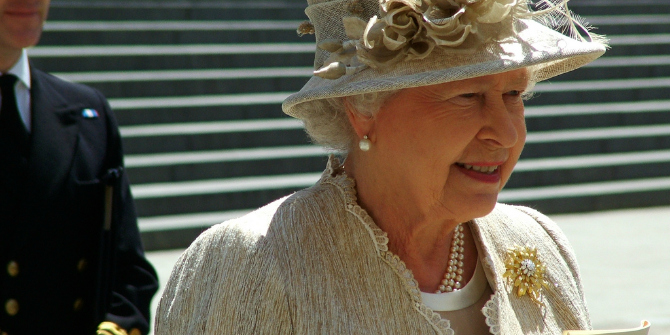
The visit also had a special d iplomatic significance in Britain’s eyes, especially from the point of view of the country’s efforts to join the European Economic Community. The first application to join the EEC had been vetoed by French President Charles de Gaulle two years previously, but the new Labour Government under Harold Wilson was already contemplating a second attempt. The German Government in Bonn was therefore a key ally and it was in this political context that the Queen spoke of the benefits of the ‘closest coopera tion’ between the two countries.
The state visit last week place under very different political circumstances in Europe but the relationship between the U K and Germany remains important especially from the British point of view. The Government in Berlin is seen as a vital ally for David Cameron’s renegotiation of Britain’s membership of the EU.
It is not surprising, therefore, that the Queen’s speech in Berlin contained a very positive assessment of the future of Anglo-German relations. Addressing an audience that included the Chancellor of Germany, Angela Merkel, and the British Prime Minister, Davi d Cameron, the Queen said that “Britain and Germany have achieved so much by working together…I have every confidence that we will continue to do so in the years ahead”. The Queen also warned that “ division in Europe is dangerous” and “we must guard against it in the West as well as in the East of our continent”.
In Britain, this speech was reported as a signal of the Queen’s implicit support for continued me mbership of the European Union. This has upset some opponents of the EU, particularly the UKIP leader, Nigel Farage, who has accused the Government of politicising the state visit to Germany. ‘But t out Eur Maj esty ’ was the typically robust headline on the front page of The Sun .
What has been forgotten in this debate is that the Queen was not speaking to a domestic audience, where the true significance of her words has been misun derstood. The Queen, unlike any current political leader in Europe, ca n speak with the authority of someone who has lived through the Second World War and who has witnessed the transformation of Europe over the l ast seven decades. In the eyes of many Europeans , especially young Europeans, Elizabeth II represents stability and continuity and remains a living link with the wartime generation.
Inso far as her Berlin speech contained any political message, it was directed at the leaders of all countries in Europe who sometimes seem to forget the original purpos e behind the European project – the reconciliation of the peoples and nations of a divided continent.
The Queen will not enter the debate on the UK’s future in the EU. If David Cameron’s renegotiation strategy fails, and the British public votes to leave the EU, this would not mean an end to Britain’s engagement with European affairs. But it would be unfortunate if, in the final years of the Queen’s reign, the country’s political leaders failed to recall the dangers of a divided Europe.
About the Author

About the author
Leave a Reply Cancel reply
Your email address will not be published. Required fields are marked *
Notify me of follow-up comments by email.
Notify me of new posts by email.
Related Posts
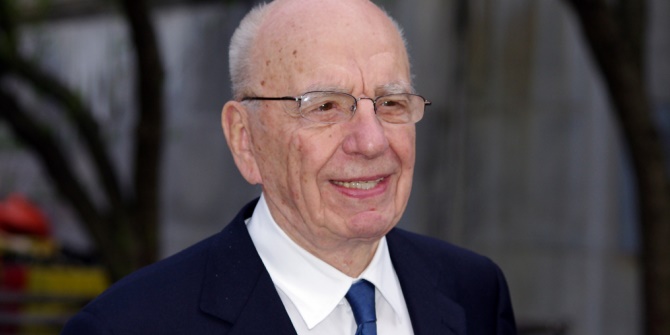
Excessive media power in the UK necessitates a more efficient and potent regulatory system
June 26th, 2014.

Do MPs’ votes in Parliament represent personal or constituency preferences?
July 27th, 2017.

This green and neglected land – how the National Planning Policy Framework fails to meet the needs of communities
June 9th, 2016.

Are UK politicians ‘local’? General elections and the trend towards greater English regionalism
March 19th, 2019.

Germany Footsteps
12 Unmissable Places To Visit In Western Germany Before You Die 😱
Western Germany, a land of breathtaking landscapes, historic towns, and cutting-edge culture, is a treasure trove of experiences waiting to be discovered. This article is your guide to the 12 unmissable places that offer a glimpse into the heart and soul of this region, promising enchanting experiences that are as diverse as they are memorable.
Curating this list wasn’t a task taken lightly. We poured over travel blogs, sifted through countless reviews, and even conversed with locals to ensure the destinations we selected are truly unparalleled.
From the majestic Rhine River to the architectural marvels of Cologne and the hidden gems tucked away in quaint villages, our criteria were simple: places that blend natural beauty, historical richness, and cultural vibrancy.
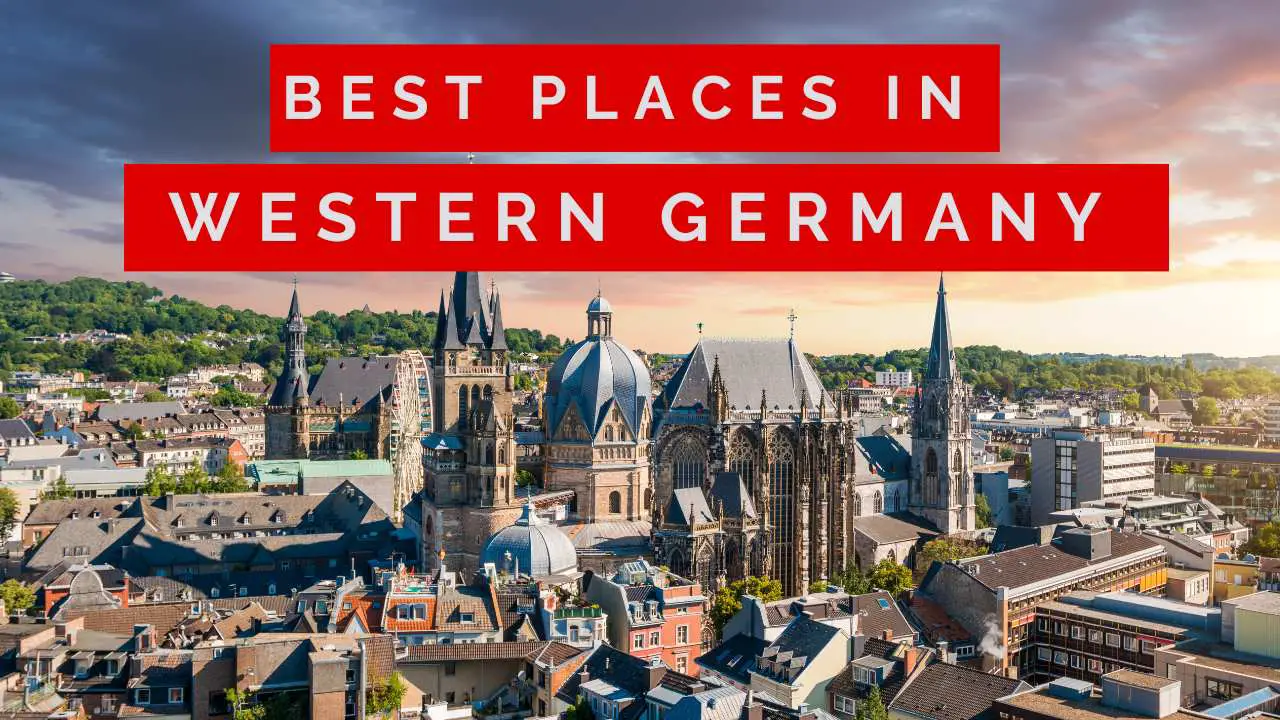
Introducing these sites, we aim to provide a vibrant mosaic of what Western Germany has to offer. Whether you’re an avid historian eager to tread through the corridors of time, a nature lover keen to explore scenic trails, or a culture enthusiast looking to dive into the local way of life, this list is tailored for you.
Our goal is to demystify the complexity of planning your journey by pinpointing destinations that promise an unforgettable adventure.
Let’s embark on this journey together, exploring the unique allure of Western Germany!
Love Germany? Click here to download your free guide to ALL of Germany’s Amazing UNESCO sites . See all 52 of them!
Table of Contents
12 Best Places To Visit In Western Germany
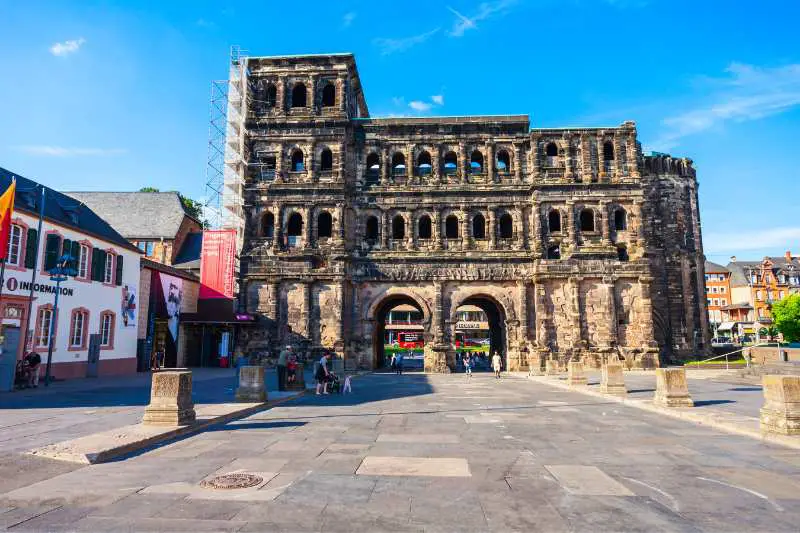
Trier merits its place on this list as Germany’s oldest city, offering an unparalleled glimpse into Roman history outside of Italy. The city is home to an amazing NINE! UNESCO World Heritage sites, including the Porta Nigra, an imposing Roman gate that serves as a symbol of Trier’s ancient grandeur.
The Trier Cathedral, with its mix of architectural styles, tells the tale of the city’s spiritual and cultural importance through centuries.
Trier’s unique blend of historical depth, including Roman baths and amphitheaters, alongside its vibrant contemporary life, epitomizes the living history museum vibe that few places can match. Here, history isn’t just to be seen but to be felt.
Click here to read our full guide to Trier.
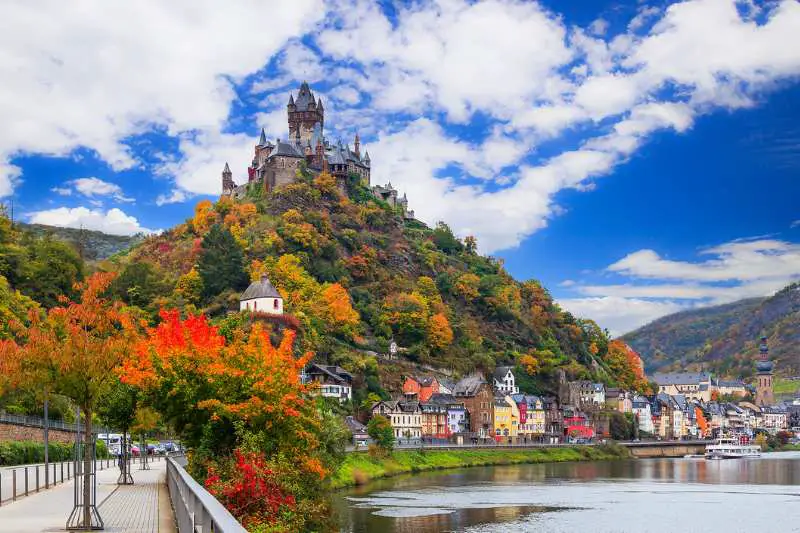
Cochem is not just a town; it’s a journey back into the fairy tales of your childhood. Dominated by the Reichsburg Cochem, a castle reborn from the medieval ashes into a picturesque fortress, the town offers panoramic views that are the epitome of the romantic Rhine landscape.
Cochem’s charm is augmented by its half-timbered houses and winding streets, leading visitors on a merry dance through history and beauty. The Moselle River adds a serene backdrop, inviting leisurely cruises that offer a unique perspective on the valley’s vineyards.
Cochem also serves as a cultural heartland, with wine festivals that celebrate the region’s viticultural heritage, making it a must-visit for those seeking both natural beauty and cultural richness.
Click here to read our full guide to Cochem.
3. Bacharach
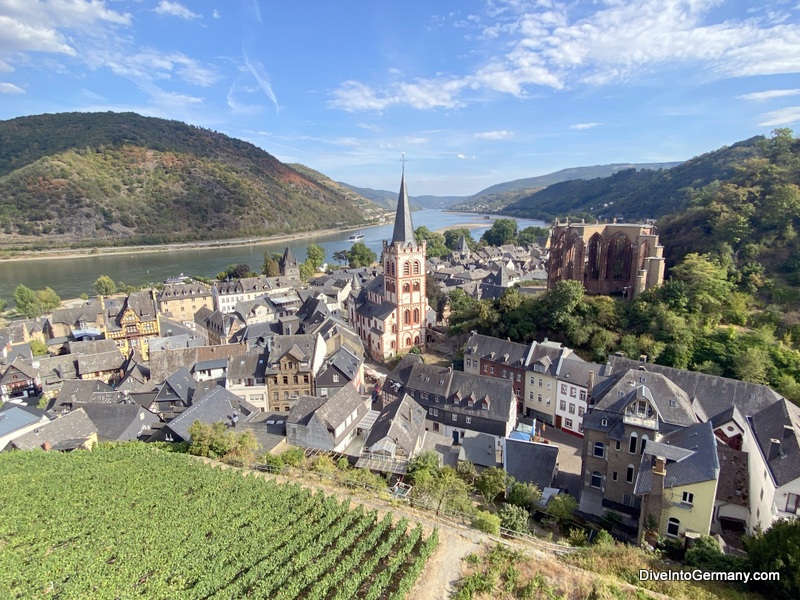
Bacharach stands as a testament to the enduring allure of the Rhine Valley, with its storied streets, ancient fortifications, and vine-clad hills. The town’s silhouette is defined by the Stahleck Castle, now a youth hostel, offering travelers the chance to wake up within walls that have echoed with centuries of history.
Bacharach’s beauty is not just in its buildings but in its spirit, with traditions and crafts that have survived the test of time. Its location on the Rhine makes it an ideal stop for explorers looking to delve into the heart of the Rhine’s romantic lore, making it a must-visit for those enchanted by history, nature, and the tales of old.
Click here to read our full guide to Bacharach.
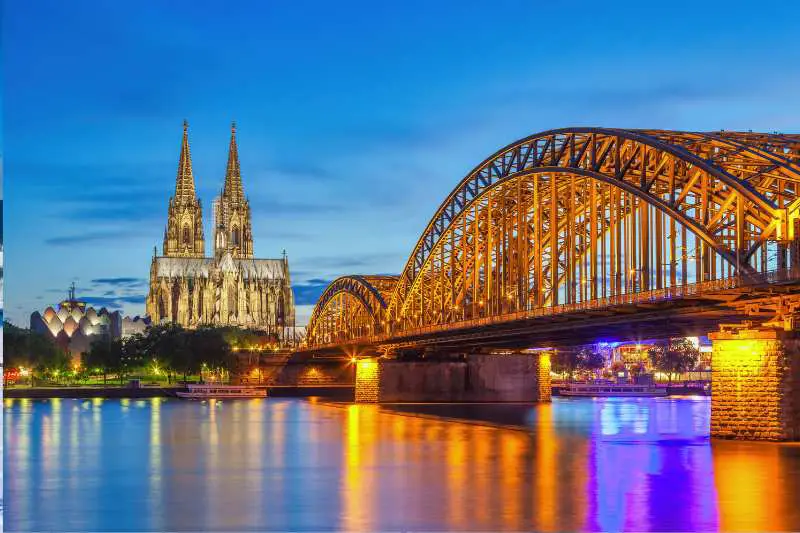
Cologne’s inclusion on this list is secured by its monumental cathedral, a Gothic masterpiece that dominates the city’s skyline and symbolizes its resilient spirit. But Cologne is more than its cathedral.
It’s a cultural hub, with museums and galleries that span the breadth of human creativity, from the ancient Romano-Germanic Museum to the avant-garde Museum Ludwig.
Cologne’s vitality is seen in its streets, filled with the fragrance of its namesake cologne and the festive spirit of its Christmas markets and Carnival . The city’s openness, diversity, and warmth make it a microcosm of modern Germany, rooted in tradition yet eagerly facing the future. It’s one of my personal favorite cities in Germany.
Click here to read more about visiting Cologne.
5. Düsseldorf
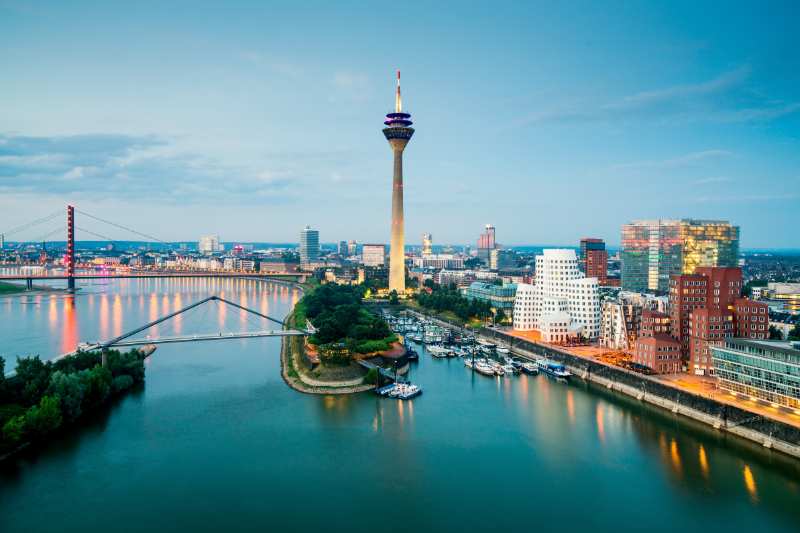
Düsseldorf earns its spot for its pioneering role in fashion, art, and architecture, juxtaposed with its Old Town. The city’s Königsallee is a shopper’s paradise, offering luxury alongside the latest trends.
Meanwhile, the Altstadt (Old Town) tells stories of Düsseldorf’s history over Altbier in the “longest bar in the world.” The Rhine Embankment Promenade exemplifies the city’s lifestyle, blending leisure with beauty.
Düsseldorf’s cultural scene, from the innovative exhibitions at the K21 to the classical performances at the Deutsche Oper am Rhein, showcases the city’s dynamic evolution from industrial powerhouse to a beacon of culture and refinement.
Click here to read more about visiting Düsseldorf.
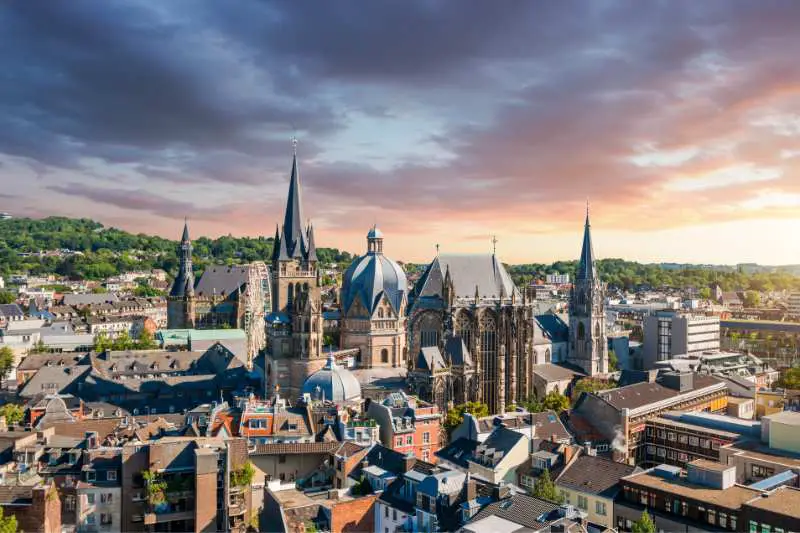
As the westernmost city of Germany and the site of Charlemagne’s palatine chapel, Aachen bridges cultures, histories, and nations. The city’s cathedral is a UNESCO world heritage site, embodying architectural innovation and the Christian world’s spiritual heritage. It’s one of my personal favorite places to visit in Germany. You can just *feel* the history here.
Aachen’s historical significance as the coronation site for German kings adds layers of historical depth to the experience of visiting. The city’s renowned hot springs, which have attracted visitors from Roman times to the present, offer a unique blend of wellness and history.
Aachen’s commitment to European unity, embodied in the International Charlemagne Prize, reflects its past and aspirations, making it a city where history, health, and a forward-looking spirit converge.
Click here for our full guide to Aachen.
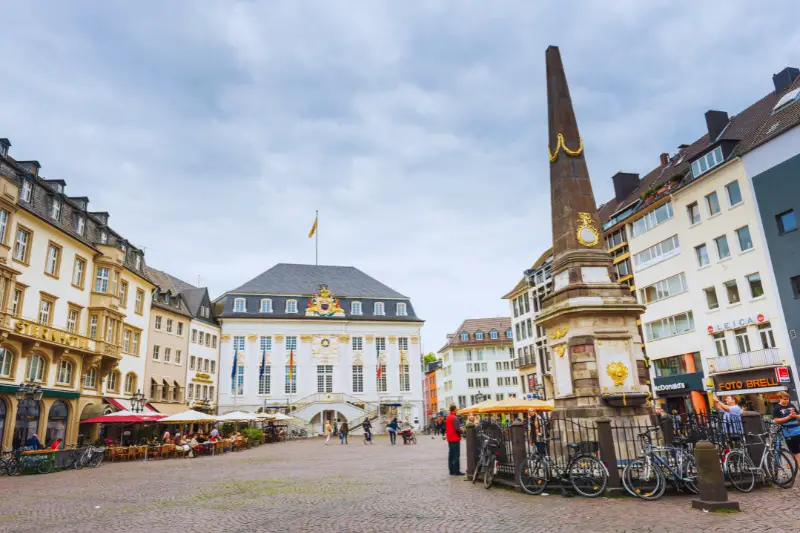
Bonn’s tranquil charm belies its importance as the former capital of West Germany and a center of German culture and politics. The city is indelibly linked with Beethoven, whose birthplace is now a museum celebrating his life and work.
But the cultural tapestry of Bonn is woven with more than just musical notes; it includes a vibrant arts scene, a plethora of museums, and the Rhine’s serene beauty.
Bonn’s role in global diplomacy, as host to several UN institutions, adds to its cosmopolitan allure. The city’s parks and gardens, such as the Rheinaue, offer peaceful retreats, making Bonn a city where history, culture, and natural beauty coexist in harmony.
Click here to read our full guide to Bonn.
8. Monschau
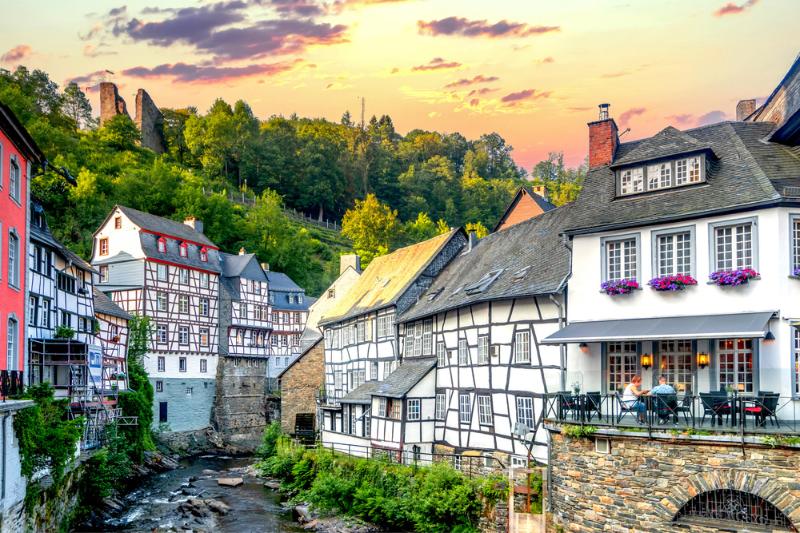
Nestled in the rolling hills of the Eifel region, Monschau is a hidden gem of Western Germany. With its perfectly preserved half-timbered houses and winding river, the town appears lifted from a fairy tale.
Visitors are mesmerized by the historic Red House, showcasing affluent local living from centuries past, and the imposing Monschau Castle, which watches over the town. Local glassblowing artisans and mustards mills add a unique cultural flair, while the surrounding lush nature trails offer outdoor enthusiasts an idyllic setting.
Make no mistake, this isn’t just any town. Monschau is truly beautiful and different to other old towns in Germany. In fact, it’s my personal second favorite town in Germany.
Click here to read more about visiting Monschau.
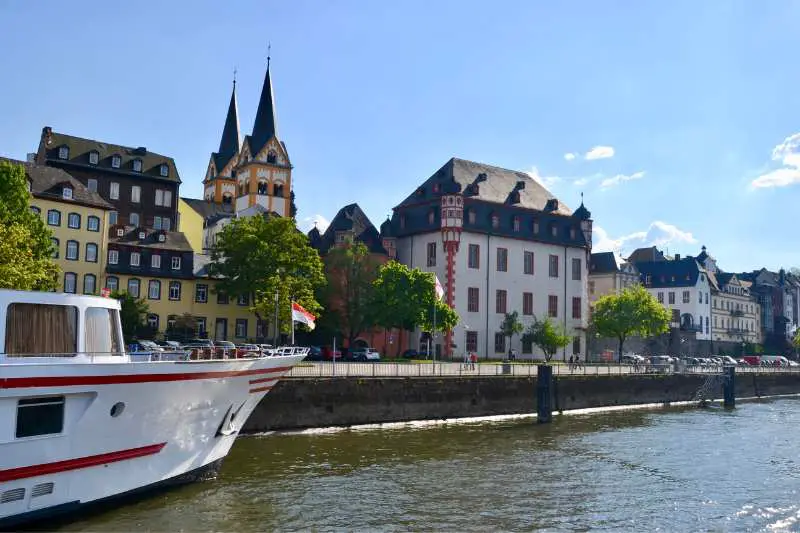
The strategic and scenic importance of Koblenz, situated at the confluence of the Rhine and Moselle rivers, is self-evident. The Deutsches Eck and its monumental statue of Emperor Wilhelm I mark the unity and might of Germany.
Koblenz’s history, however, stretches back over two millennia, offering layers of cultural heritage to explore, from ancient forts to picturesque castles. The cable car ride to Ehrenbreitstein Fortress provides not only a thrilling experience but also panoramic views of the UNESCO-protected Upper Middle Rhine Valley.
Koblenz encapsulates the romantic essence of the Rhine and Moselle, making it an essential stop for those drawn to the allure of rivers, vineyards, and castles.
10. Münster
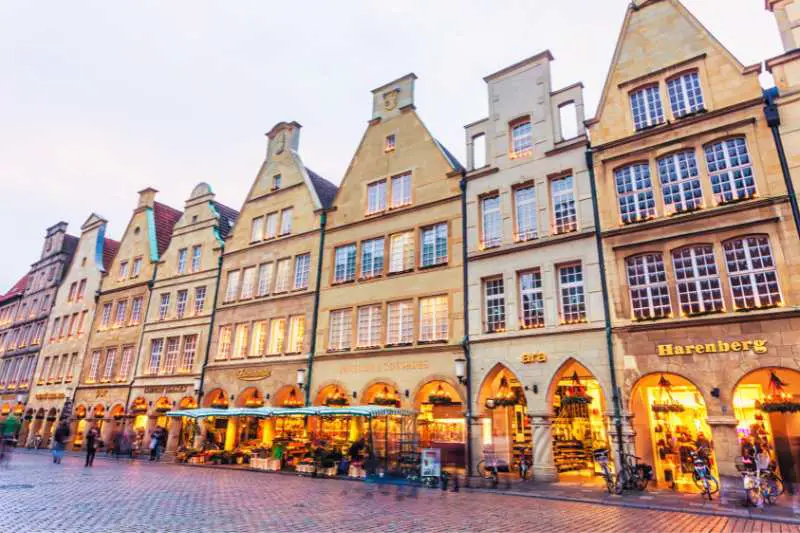
Münster’s reputation as the “City of Cycling” is indicative of its forward-thinking attitude and commitment to sustainability. However, it’s the city’s rich history, particularly as the site of the Peace of Westphalia, that adds gravitas to its charming streets and gabled houses.
The Prinzipalmarkt, with its historic Town Hall, stands as a testament to Münster’s importance in European history. The city’s university infuses Münster with a youthful vibrancy, complementing its historical roots with a dynamic cultural scene.
Münster’s blend of history, education, and green living exemplifies the contemporary German city that values both its past and its future.

Embrace the allure of Kassel, a city that seamlessly blends art, history, and natural beauty in the heart of the country. While located quite centrally within Germany, Kassel just slides into the list thanks to being in the state of Hessen.
Home to the renowned documenta art exhibition, Kassel exudes a creative energy that captivates visitors from around the globe. Explore the stunning Bergpark Wilhelmshöhe, a UNESCO World Heritage site boasting magnificent water features and the iconic Hercules monument overlooking the city.
Dive into history at the grand Wilhelmshöhe Palace, a testament to Baroque splendor and royal opulence. Learn about the famous Brothers Grimm at Grimmwelt.
With its vibrant cultural scene, picturesque parks, and a rich tapestry of architectural treasures, Kassel is a must-visit destination that promises an enchanting journey through art, heritage, and scenic wonders. There’s a surprising amount to do here for a city that’s rarely mentioned outside of Germany.
Click here to read a detailed guide to Kassel.
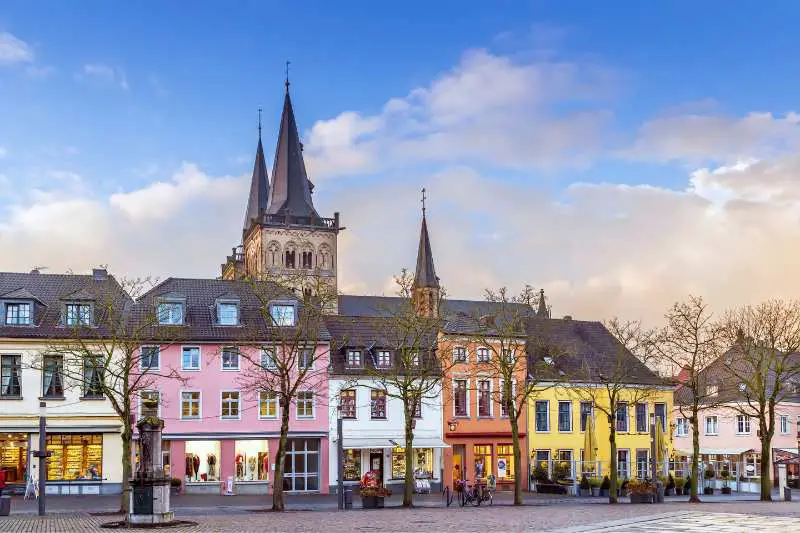
Xanten is a unique fusion of ancient history and pastoral charm. The Archaeological Park, one of Germany’s largest open-air museums, brings the Roman past to life, allowing visitors to walk in the footsteps of soldiers and citizens of Roman Germania.
The medieval Xanten Cathedral serves as a landmark of spiritual and architectural significance.
Xanten’s smaller scale does not diminish its appeal; instead, it offers a more intimate encounter with Germany’s layered history, from Rome to the Middle Ages. Its blend of historical immersion and natural beauty, set beside the Rhine, makes Xanten a microcosm of the region’s broader attractions.
Exploring Western Germany offers an unparalleled journey through rich historical tapestry, breathtaking landscapes, and modern innovation. Each location on our list, from the enchanting old towns to the awe-inspiring cities, stands as a testament to the diverse beauty and cultural heritage this region has to offer. As you plan your travels, remember that the true magic of these destinations lies not only in their scenic views and historic landmarks but in the stories and traditions that have shaped them.
Whether you’re a history aficionado, a lover of natural beauty, or a fan of contemporary culture, Western Germany has something special in store for you. Venture beyond the beaten path to uncover the unique charm of each place. These twelve unmissable spots are merely the beginning of what promises to be an unforgettable exploration of Western Germany’s heart and soul.
Looking for more information about visiting Western Germany? Find all our guides to Western Germany here or check out our one week itinerary for Cologne here that includes some of the highlights of West Germany. You can also find our list to the best places to visit in Northern Germany here , Southern Germany here and Eastern Germany here .
Related Articles:

By Sharon Gourlay
Sharon first fell in love with Germany back in 2000 on her first visit. She loves the long history, the picturesque Old Towns, the castles, the food, everything really! Since then, she has visited many times and loves writing about Germany here so you can enjoy it too. In fact, Sharon loves German culture so much that she sent her kids to a German primary school in Australia. She especially loves Berlin and towns with charming Old Towns like Celle and Quedlinburg. Sharon also has a Certificate III in International Travel Sales and understands the nitty gritty of travel planning. Through this site, she'll help you have the perfect trip to Germany whether it's your first or tenth time!
Over a period of 25 years in business I spent a great deal of time in this part of Germany, my routine was always the same, land in Frankfurt on a Thursday, drive to Dusseldorf-Benrath on the Sunday along the Rhine Valley Road. Many, many very happy memories of little hotels like the Lorelai in Sank Goar , the Rhine Terrasse at Benrath and my base in Kelsterbach the Columbas which I believe is no longer ther a shame it was a lovely family hotel

Leave a comment Cancel reply
Your email address will not be published. Required fields are marked *
Save my name, email, and website in this browser for the next time I comment.
This site uses Akismet to reduce spam. Learn how your comment data is processed .

- Share full article
Advertisement
Supported by
Honecker's West German Visit: Divided Meaning
By Serge Schmemann, Special To the New York Times
- Sept. 7, 1987
When Erich Honecker, the East German leader, arrives in Bonn on Monday for his first official visit to West Germany, it is generally agreed that he will be making history. What kind of history, however, remains very much in dispute.
For Mr. Honecker, who recently turned 75 years old, the visit is the triumphant realization of a goal he has pursued fervently, sometimes brutally, for almost four decades: to have his Communist state, the German Democratic Republic, fully accepted by Bonn as a sovereign, legitimate and permanently separate state.
Chancellor Helmut Kohl of West Germany will try to use the visit to demonstrate the opposite: that Mr. Honecker's breach of the political divide shows Bonn's success in pursuing West Germany's constitutional commitment to bringing the divided Germans back together.
These competing themes have permeated all relations between the two Germanys since they were carved out of the ruins of Hitler's Third Reich 38 years ago. The historic significance of Mr. Honecker's visit is probably that they have converged in a way that makes the summit meeting keenly welcome to both sides. Amity Growing Since 1972
Despite the fundamental difference in their perception of each other, relations between the two Germanys have been improving steadily since they formally agreed in 1972 to work for ''normal, good-neighborly relations'' and to exchange permanent missions.
Since then, West Germany has extended billions of marks in credits to the East, and has paid out millions more as ransom for imprisoned dissidents. Mr. Honecker, for his part, has sharply increased the flow of visitors to the West. An official in East Berlin said a million East Germans under pension age were expected to visit West Germany this year, up from 50,000 in 1985.
Yet the competition rages on, ranging from purely symbolic gestures, such as the policy of West German television of including East German cities in its news roundup, to the deadly serious, represented by the Berlin wall, whose construction Mr. Honecker supervised in 1961 as the East German security chief.
West Germany, dedicated to the proposition that the German nation is still one, grants immediate and automatic citizenship to any East German who makes it to the West. East Berlin says this policy poses the main obstacle to letting more East Germans travel abroad.
East Germany is equally strident in insisting that the Germanys are forever two, and that their social systems and people, as Mr. Honecker recently said, are ''as different as fire and water.'' State Visit or Working Visit
Mr. Honecker will step right into the middle of the argument from the moment he alights from his plane at the Bonn-Cologne airport. In the East German view, he is arriving on a state visit as a foreign head of state. Mr. Kohl, for his part, has insisted that Mr. Honecker is coming on a ''working visit,'' implying no special recognition.
All the protocol of the visit has been painstakingly worked out to sustain both claims. The West Germans have scaled down the arrival ceremonies just a notch below what heads of state normally receive. Mr. Honecker, for example, will be escorted by 17 rather than 21 motorcyclists, and the program lists ''anthems,'' not ''national anthems.''
But the East German leader has been left with enough flag-raisings, anthems, troop reviews and ceremonies, including a state dinner Monday night hosted by President Richard von Weiszacker, to make his point.
Mr. Honecker, moreover, is taking along his Foreign Minister, Oskar Fischer, as would a state leader on a foreign mission. Bonn has deliberately left its Foreign Minister, Hans-Dietrich Genscher, off the official welcoming committee, though Mr. Genscher has scheduled meetings with Mr. Fischer.
Neither side is expected to yield on its stance in the course of Mr. Honecker's five-day visit. The East German leader will spend the first two days in Bonn in a round of political meetings, and then will tour Dusseldorf and Essen, where he will meet with an occasional hunting companion, Berthold Beitz, the head of the giant Krupp enterprise. Will Visit His Hometown
Mr. Honecker then heads south for Wiebelskirche, the Saarland town in which he grew up, where he first took up the banner of Communism and where his parents are buried. His last stops will be Munich, where Mr. Honecker will meet with the Bavarian Premier, Franz Josef Strauss, who was instrumental in arranging the first major bank credits for East Germany, and to the site of the Dachau concentration camp.
The concrete results of the visit are likely to be relatively minor. Agreements are expected on joint scientific research and cooperation in areas such as the environment, AIDS and atomic energy, and West Germany is likely to extend new credits for highway and rail improvements in East Germany.
At the same time, each side is expected to beat its own political drum. Mr. Kohl will speak on human rights, will demand more cross-border visits and will assail the orders to shoot people who try to breach the Berlin Wall. Mr. Honecker will issue calls for peace and disarmament and will demand full diplomatic recognition and a curb on the West German practice of giving East Germans automatic citizenship.
The public disagreement and maneuvering, however, shrink before the symbolic importance the visit has for both sides, both at home and as a demonstration of independence from their respective superpower patrons. Soviet Blocked Earlier Visits
Twice before, Mr. Honecker's attempts to visit West Germany were stymied by Moscow because they contradicted the Kremlin's policy of demonstrating high anger with Bonn over the stationing of new American missiles in Europe. A visit scheduled for September 1984 was canceled only three weeks before it was to start.
This time, the visit was made possible in large part because of the general improvement of Soviet-American relations. But Mikhail S. Gorbachev probably had other motives as well. For one thing, the Soviet leader stands to add a bit more gloss to his already shiny image in both Germanys, and for another, the stick-and-carrot handling of the visit serves to remind both sides that the road to reconciliation is through Moscow.
For Mr. Honecker, the chance to corner a bit of spotlight must be a welcome relief from the political pressure Mr. Gorbachev's policies of change have placed on him. At 75, the East German leader is just the sort of aging Communist chieftain Mr. Gorbachev is trying to retire, and the chants of ''Gorbachev! Gorbachev!'' at a recent demonstration in East Berlin were a worrisome signal to Mr. Honecker that the Russian's calls for change were proving contagious.
For his part, Mr. Honecker has not concealed his irritation with the Kremlin's belated conversion to openness and economic reconstruction, to the extent that some of Mr. Gorbachev's speeches have been censored in the East German press. Strongest Economy in Bloc
On the economic side, the East Germans, with the strongest economy in the Soviet bloc and an incomparably higher standard of living than the Russians, feel they have no need for Soviet guidance. As Prof. Gudrun Langendorf of the East German Academy of Social Sciences said in a recent interview, ''Most things that are being done in the Soviet Union were done here a long time ago.''
''Glasnost,'' or openness, has been more troubling. As one East German scholar explained, East Germany has long had ''imported glasnost'' in the form of West German radio and television. And while Mr. Gorbachev feels it necessary to lead the Soviet Union's people out of darkness, the problem for East Germany's leaders is a populace that is considerably better informed than they would like.
If Mr. Honecker's visit has refired the old debates about two Germanys or one, it has also raised the question whether these issues still inspire the same passions among younger Germans.
West Germany: The First 100 Days
W hen pollsters asked West Germans last August if they knew who Kurt Georg Kiesinger was, fully 45% said: Sorry, never heard of the fellow. Last week, 100 days after Kiesinger became Chancellor, the polls showed not only that 96% of all West Germans know their man, but also that 60% think he is doing a good job and only 6% criticize his work. The new fame of Baden-Württemberg’s former minister-president is by no means undeserved. Since he put together the unprecedented black-red coalition of Christian Democrats and Social Democrats, Kiesinger has brought to Europe’s most populous (59 million) and economically powerful country a new direction at home and a fresh and assertive voice in world affairs.
West Germany is no longer an acquiescent partner of the U.S., nor the abominable no-man of East-West relations. Under Kiesinger, it is an increasingly self-confident nation that is searching for solutions to cold war problems on its own and putting its economic house in order without whining for U.S. help. Its attitudes, however bothersome they may occasionally be to the U.S., are a refreshing change from the search for reassurance that marked the West Germany of Ludwig Erhard. U.S. diplomats, in fact, are not unhappy at accepting a bit of independence and even some nose-tweaking—as when Kiesinger last week accused the U.S. and the Soviet Union of “complicity” in the nuclear nonproliferation treaty—in return for a more self-assured German government.
Eastward Initiatives. Kiesinger’s first aim when he took office last December was to balance the budget, whose looming $1.2 billion deficit had caused Erhard’s Cabinet to break up. With some sleight of hand, he did so, and he managed to put some steam back into the lagging economy by speeding up federal spending. He also struck at the root cause of Erhard’s financial distress: the billion-dollar offset payments that Bonn makes yearly to support U.S. and British forces in Germany. Contending that Bonn no longer had the financial health to afford such large payments, Kiesinger stuck to his position until the U.S. last week suggested a new, less painful monetary scheme under which Bonn may buy Treasury bonds to offset the outflow of dollars from the U.S. Softly underlining his determination to be his own master, Kiesinger made his first state visit to Paris. But he will probably go to Washington in June before his second scheduled meeting with Charles de Gaulle.
Kiesinger’s boldest initiatives by far have been made toward the Soviet bloc. Adenauer and Erhard cold-shouldered East Germany and anyone who had anything to do with it. But Kiesinger, influenced by his Socialist Foreign Minister, Willy Brandt, and by All-German Affairs Minister Herbert Wehner, has offered a policy of friendship to the Eastern countries, including East Germany, in hopes of creating the relaxed atmosphere in which German reunification might eventually be permitted. Unfortunately, Poland and Russia are so alarmed by this initiative that they have become even more hostile than usual. The Russians have started a new propaganda campaign in the East bloc that paints West Germany as the haven of unrepentant Nazis, who lust for nuclear weapons and a chance to use them to regain lost land in Poland and Czechoslovakia. Said Kiesinger last week: “I address a modest suggestion to Moscow: Let us stop scolding and accusing each other.”
Until 1973? The Grand Coalition thus has had its measure of trouble as well as success. Still, on balance, it has so far been good for Germany. In fact, Germans by and large are so pleased with having a government that governs effectively that there is some talk among the moderates in both parties about not dissolving the coalition in 1969 as originally planned but continuing it until 1973.
More Must-Reads from TIME
- How Joe Biden Leads
- TIME100 Most Influential Companies 2024
- Javier Milei’s Radical Plan to Transform Argentina
- How Private Donors Shape Birth-Control Choices
- What Sealed Trump’s Fate : Column
- Are Walking Pads Worth It?
- 15 LGBTQ+ Books to Read for Pride
- Want Weekly Recs on What to Watch, Read, and More? Sign Up for Worth Your Time
Contact us at [email protected]
- Election 2024
- Entertainment
- Newsletters
- Photography
- Personal Finance
- AP Investigations
- AP Buyline Personal Finance
- AP Buyline Shopping
- Press Releases
- Israel-Hamas War
- Russia-Ukraine War
- Global elections
- Asia Pacific
- Latin America
- Middle East
- Election Results
- Delegate Tracker
- AP & Elections
- Auto Racing
- 2024 Paris Olympic Games
- Movie reviews
- Book reviews
- Personal finance
- Financial Markets
- Business Highlights
- Financial wellness
- Artificial Intelligence
- Social Media
Macron begins the first state visit to Germany by a French president in 24 years
German President Frank-Walter Steinmeier, right, and French President Emmanuel at the end of a press conference at Bellevue Place in Berlin, Germany, Sunday, May 26, 2024. (AP Photo/Markus Schreiber)
French President Emmanuel Macron attends a press conference at Bellevue Place in Berlin, Germany, Sunday, May 26, 2024. (AP Photo/Markus Schreiber)
German President Frank-Walter Steinmeier, right, and French President Emmanuel Macron enter the podium for a press conference at Bellevue Place in Berlin, Germany, Sunday, May 26, 2024. (AP Photo/Markus Schreiber)
German President Frank-Walter Steinmeier, right, and French President Emmanuel Macron walk to a press conference at Bellevue Place in Berlin, Germany, Sunday, May 26, 2024. (AP Photo/Markus Schreiber)
- Copy Link copied
BERLIN (AP) — President Emmanuel Macron on Sunday started the first state visit to Germany by a French head of state in 24 years, a three-day trip meant to underline the strong ties between the European Union’s traditional leading powers ahead of European Parliament elections in which far-right parties in both countries hope for gains.
The visit was originally meant to take place last July but was postponed at the last minute due to rioting in France following the killing of a 17-year-old by police .
While Macron is a frequent visitor to Germany as Paris and Berlin try to coordinate their positions on EU and foreign policy, this is the first state visit with full pomp since Jacques Chirac came in 2000. Macron and his wife, Brigitte, are being hosted by Germany’s largely ceremonial president, Frank-Walter Steinmeier.
It is “proof of the depth of the friendship between France and Germany” that Macron is visiting as Germany celebrates the 75th anniversary of its post-World War II constitution and before it marks the 35th anniversary in November of the fall of the Berlin Wall, Steinmeier said.
Steinmeier is holding a state banquet for Macron at his Bellevue palace in Berlin on Sunday evening before the two presidents travel on Monday to the eastern city of Dresden, where Macron will make a speech, and on Tuesday to Muenster in western Germany. The state visit will be followed later Tuesday by a meeting between Macron, German Chancellor Olaf Scholz and ministers from both countries at a government guest house outside Berlin.
Germany and France, which have the EU’s biggest economies, have long been viewed as the motor of European integration, though there have often been differences in policy and emphasis between the two neighbors on a range of matters.
That was evident earlier this year in different positions on whether Western countries should rule out sending ground troops to Ukraine. Both nations are strong backers of Kyiv.
Macron on Sunday said there has frequently been talk of problems in Franco-German relations over the decades, but “France and Germany together have accomplished extraordinary things — they have been at the heart of this Europe.” He contrasted that with the countries’ history of war against each other until 1945.
He renewed a warning that Europe could “die” if it fails to build its own robust defense as Russia’s war in Ukraine rages on, or if it fails to undertake major trade and economic reforms to compete with China and the U.S.
Ahead of the European Parliament elections next month, Macron said that “fear of a changing world” is feeding a rise of the far-right in Europe.
“When we let these fears transform into anger, that feeds extremes,” he said, advocating “respect” in listening to people’s worries and greater “efficiency” in dealing with their problems.
Macron Begins the First State Visit to Germany by a French President in 24 Years
President Emmanuel Macron has started the first state visit to Germany by a French head of state in 24 years

Markus Schreiber
German President Frank-Walter Steinmeier, right, and French President Emmanuel at the end of a press conference at Bellevue Place in Berlin, Germany, Sunday, May 26, 2024. (AP Photo/Markus Schreiber)
BERLIN (AP) — President Emmanuel Macron on Sunday started the first state visit to Germany by a French head of state in 24 years, a three-day trip meant to underline the strong ties between the European Union's traditional leading powers ahead of European Parliament elections in which far-right parties in both countries hope for gains.
The visit was originally meant to take place last July but was postponed at the last minute due to rioting in France following the killing of a 17-year-old by police .
While Macron is a frequent visitor to Germany as Paris and Berlin try to coordinate their positions on EU and foreign policy, this is the first state visit with full pomp since Jacques Chirac came in 2000. Macron and his wife, Brigitte, are being hosted by Germany’s largely ceremonial president, Frank-Walter Steinmeier.
It is “proof of the depth of the friendship between France and Germany” that Macron is visiting as Germany celebrates the 75th anniversary of its post-World War II constitution and before it marks the 35th anniversary in November of the fall of the Berlin Wall, Steinmeier said.
Steinmeier is holding a state banquet for Macron at his Bellevue palace in Berlin on Sunday evening before the two presidents travel on Monday to the eastern city of Dresden, where Macron will make a speech, and on Tuesday to Muenster in western Germany. The state visit will be followed later Tuesday by a meeting between Macron, German Chancellor Olaf Scholz and ministers from both countries at a government guest house outside Berlin.
Germany and France, which have the EU's biggest economies, have long been viewed as the motor of European integration, though there have often been differences in policy and emphasis between the two neighbors on a range of matters.
That was evident earlier this year in different positions on whether Western countries should rule out sending ground troops to Ukraine. Both nations are strong backers of Kyiv.
Macron on Sunday said there has frequently been talk of problems in Franco-German relations over the decades, but “France and Germany together have accomplished extraordinary things — they have been at the heart of this Europe.” He contrasted that with the countries' history of war against each other until 1945.
He renewed a warning that Europe could “die” if it fails to build its own robust defense as Russia's war in Ukraine rages on, or if it fails to undertake major trade and economic reforms to compete with China and the U.S.
Ahead of the European Parliament elections next month, Macron said that “fear of a changing world” is feeding a rise of the far-right in Europe.
“When we let these fears transform into anger, that feeds extremes,” he said, advocating “respect" in listening to people's worries and greater “efficiency” in dealing with their problems.
Copyright 2024 The Associated Press . All rights reserved. This material may not be published, broadcast, rewritten or redistributed.
Photos You Should See - May 2024

Join the Conversation
Tags: Associated Press , diplomacy , politics , world news
America 2024

Health News Bulletin
Stay informed on the latest news on health and COVID-19 from the editors at U.S. News & World Report.
Sign in to manage your newsletters »
Sign up to receive the latest updates from U.S News & World Report and our trusted partners and sponsors. By clicking submit, you are agreeing to our Terms and Conditions & Privacy Policy .
You May Also Like
The 10 worst presidents.
U.S. News Staff Feb. 23, 2024

Cartoons on President Donald Trump
Feb. 1, 2017, at 1:24 p.m.

Photos: Obama Behind the Scenes
April 8, 2022

Photos: Who Supports Joe Biden?
March 11, 2020

What to Know About Joro Spiders
Cecelia Smith-Schoenwalder June 7, 2024

Takeaways From the Hunter Biden Case
Laura Mannweiler June 7, 2024

Trump’s Latest Campaign Pledge: Revenge
Lauren Camera June 7, 2024

Surprise! 272K Jobs Added in May
Tim Smart June 7, 2024

U.S. News Summit Focuses on Equity
Aneeta Mathur-Ashton June 6, 2024

The Hunter Biden Trial, Explained
Laura Mannweiler June 6, 2024


- United Kingdom
- United States
- South America
- Small Business
- Entertainment
- Food & Drink
- Viral Trends
Trending Now

Potentially fatal side effects discovered in widely-used sweetener

Dems and media fail to deceive: White House deeply involved in Trump prosecutions

VP Harris and Maryland Senate candidate Alsobrooks join forces to combat gun violence

Walmart introduces exciting new benefits for employees, including bonus plan and opportunities in skilled trade roles

The Feds are Investigating Mortgage Closing Fees: Here’s Why they’re under Scrutiny.

Macron makes first state visit to Germany in over two decades

The recent state visit of French President Emmanuel Macron to Germany marks the first time in 24 years that a French president has paid such a visit to Germany. Initially scheduled for last July, the visit was postponed due to riots in France following a police killing. During this three-day trip, Macron and his wife were hosted by Germany’s president, Frank-Walter Steinmeier, with a state banquet held in their honor at Bellevue Palace. The visit also coincides with Germany’s celebration of the 75th anniversary of its post-World War II constitution. Macron and Steinmeier will travel to Dresden, where Macron will deliver a speech, and then visit Muenster in western Germany before concluding the visit with a meeting between Macron, German Chancellor Olaf Scholz, and ministers from both countries at a government guest house outside Berlin.
Germany and France, as the EU’s largest economies, have long been considered the driving force of European integration, despite occasional policy differences between the two nations. Earlier this year, disagreements between the two countries arose regarding whether Western countries should rule out sending troops to Ukraine. Macron did not rule out the possibility of putting boots on the ground in Ukraine, a stance that Scholz quickly distanced himself from. However, both countries remain strong supporters of Kyiv, demonstrating their shared commitment to supporting Ukraine despite their diverging policy positions on potential military involvement.
The significance of Macron’s state visit to Germany lies in the emphasis it places on the strong ties between the European Union’s leading powers. While Macron has visited Germany in the past to coordinate EU and foreign policy matters, this visit marks the first time he has been welcomed with full ceremonial honors since Jacques Chirac’s visit in 2000. The visit is a symbolic representation of the close relationship between France and Germany, which is crucial for driving European integration forward. The state visit serves to highlight the ongoing partnership and collaboration between the two nations in areas such as EU policy, foreign affairs, and economic cooperation.
The state visit also comes at a time when both Germany and France are facing significant challenges, both domestically and internationally. Germany is navigating a leadership transition with Olaf Scholz taking over as chancellor, while France is dealing with ongoing social and political unrest. The visit provides an opportunity for both countries to reaffirm their commitment to working together on key issues such as climate change, digital transformation, and security. By coming together to address common challenges and discuss shared priorities, Germany and France can strengthen their partnership and continue to play a leading role in shaping the future of Europe.
As the visit progresses, Macron and Steinmeier are expected to discuss a wide range of issues, including EU reform, defense cooperation, and economic recovery post-pandemic. Both leaders are likely to reaffirm their commitment to advancing European integration, fostering closer cooperation between EU member states, and addressing shared challenges facing the continent. The visit serves as a reminder of the importance of the Franco-German partnership in driving European unity and progress. By working together, Germany and France can continue to set the agenda for the EU and play a decisive role in shaping the future of the continent.
In conclusion, Macron’s state visit to Germany underscores the enduring strength of the relationship between France and Germany and their shared commitment to European integration. The visit highlights the importance of continued partnership and cooperation between the two nations in addressing common challenges and advancing shared priorities. By coming together to discuss key issues and reaffirm their commitment to working together, Germany and France can strengthen their leadership role within the EU and contribute to shaping a more united and prosperous future for Europe.
You Might Like

New CCTV footage shows Michael Mosley, who went missing on Greek island

Zelensky in Paris: France increases its military assistance, oppositions criticize

European Election: Last day of the election campaign. Programs and visions compared between the candidates.

Fake Poroshenko impersonator fooled UK Foreign Secretary Cameron in video call

Political parties in UK argue about Brexit and immigration during initial television debate

The Friendly Face of Capitalism: Combating Homelessness from the Stock Market

- Privacy Policy
Type above and press Enter to search. Press Esc to cancel.
- Classifieds
- Merchandise
- Newsletters
- Daily Independent
- Apache Junction Independent
- Chandler Independent
- Florence Independent
- Gilbert Independent
- Glendale Independent
- Litchfield Park Independent
- Mesa Independent
- Paradise Valley Independent
- Peoria Independent
- Queen Creek Independent
- Scottsdale Independent
- Sun City Independent
- Sun City West Independent
- Surprise Independent
- Tempe Independent
- Sun Life Magazine
- Submissions
Macron begins the first state visit to Germany by a French president in 24 years
Join our family of readers for as little as $5 per month and support local, unbiased journalism.
Already have an account? Log in to continue .
Current print subscribers can create a free account by clicking here
Otherwise, follow the link below to join.

Sincerely, Charlene Bisson, Publisher, Independent Newsmedia

BERLIN (AP) — President Emmanuel Macron on Sunday started the first state visit to Germany by a French head of state in 24 years, a three-day trip meant to underline the strong ties between the European Union's traditional leading powers ahead of European Parliament elections in which far-right parties in both countries hope for gains.
The visit was originally meant to take place last July but was postponed at the last minute due to rioting in France following the killing of a 17-year-old by police .
While Macron is a frequent visitor to Germany as Paris and Berlin try to coordinate their positions on EU and foreign policy, this is the first state visit with full pomp since Jacques Chirac came in 2000. Macron and his wife, Brigitte, are being hosted by Germany’s largely ceremonial president, Frank-Walter Steinmeier.
It is “proof of the depth of the friendship between France and Germany” that Macron is visiting as Germany celebrates the 75th anniversary of its post-World War II constitution and before it marks the 35th anniversary in November of the fall of the Berlin Wall, Steinmeier said.
Steinmeier is holding a state banquet for Macron at his Bellevue palace in Berlin on Sunday evening before the two presidents travel on Monday to the eastern city of Dresden, where Macron will make a speech, and on Tuesday to Muenster in western Germany. The state visit will be followed later Tuesday by a meeting between Macron, German Chancellor Olaf Scholz and ministers from both countries at a government guest house outside Berlin.
Germany and France, which have the EU's biggest economies, have long been viewed as the motor of European integration, though there have often been differences in policy and emphasis between the two neighbors on a range of matters.
That was evident earlier this year in different positions on whether Western countries should rule out sending ground troops to Ukraine. Both nations are strong backers of Kyiv.
Macron on Sunday said there has frequently been talk of problems in Franco-German relations over the decades, but “France and Germany together have accomplished extraordinary things — they have been at the heart of this Europe.” He contrasted that with the countries' history of war against each other until 1945.
He renewed a warning that Europe could “die” if it fails to build its own robust defense as Russia's war in Ukraine rages on, or if it fails to undertake major trade and economic reforms to compete with China and the U.S.
Ahead of the European Parliament elections next month, Macron said that “fear of a changing world” is feeding a rise of the far-right in Europe.
“When we let these fears transform into anger, that feeds extremes,” he said, advocating “respect" in listening to people's worries and greater “efficiency” in dealing with their problems.
Subscribers make this story possible.
Support the journalists of independent newsmedia ..

Other items that may interest you
Rishi Sunak's D-Day departure is just the latest in a long line of gaffes in UK election campaigns
Slovaks and others go to the polls in eu elections under the shadow of an assassination attempt, iran helicopter crash shows tehran's reliance on an aging fleet as well as its challenges at home, canadian auto parts billionaire frank stronach, 91, arrested on sexual assault charges.
Most popular stories in Daily Independent
At D-Day ceremony, American veteran hugs Ukraine's Zelenskyy and calls him a savior
India's modi elected as leader of coalition and set to form new government, sweden's foremost opera and ballet theater fined $300,000 for 2023 fatal fall of stage technician, yemen's houthi rebels detain at least 9 un staffers and others in sudden crackdown, officials say.
Macron is hosting Biden for a state visit as the two leaders try to move past trade tensions
PARIS (AP) — President Joe Biden is being feted by French President Emmanuel Macron with a state visit Saturday, as the two allies aim to show off their partnership on global security issues and move past trade tensions.
Biden and Macron attended ceremonies marking the 80th anniversary of D-Day on Thursday. They met separately the following day with Ukrainian President Volodymyr Zelenskyy in Paris — engagements they both used to underscore the urgent need to support Kyiv’s fight against Russia’s invasion.
But Macron and Biden have often chafed at the pace of support for Ukraine, especially as the U.S. — by far the largest contributor to Kyiv’s defense — was forced to pause aid shipments for months while congressional Republicans held up an assistance package.
The state visit will begin with a welcome ceremony at the Arc de Triomphe and a military parade along the Champs-Élysées leading to the Élysée Palace, where the two will hold official meetings and deliver public statements. Later, Macron will host a state dinner at the palace for Biden and his wife, Jill.
Biden hosted Macron in December 2022 at the White House for the first state visit of his presidency — a glamorous affair that included business and political figures after the COVID-19 pandemic.
First lady Jill Biden will join her husband for the Saturday events, returning to France aboard a government plane after spending Friday in Delaware to support their son, Hunter Biden, who is standing trial on federal gun charges.
Biden’s trip to France also comes ahead of Sunday’s European Parliament election, in which the far right is likely to emerge as one of the biggest winners while Macron’s pro-EU movement is flagging.
A top French official said Macron and Biden have a friendly and warm relationship and stressed that the U.S. president is spending five days in France, reflecting the importance he attaches to the visit. The official spoke anonymously, in line with customary practices for Macron’s office.
The official said the U.S. presidential campaign was not a factor in the discussion.
Macron previously hosted then-President Donald Trump, the Republicans’ presumptive 2024 nominee, in France for Bastille Day in 2017, before being hosted himself by Trump in 2018 for a state visit, before the two leaders’ relationship soured.
Both U.S. and French officials said Ukraine would be at the top of Saturday’s agenda, but the centerpiece of the weekend event would be the strength of the alliance, proven at Normandy 80 years ago, but with roots far deeper.
“It’s probably a good thing for us to remember that we didn’t win our independence either without some foreign help or foreign assistance, specifically from France,” White House national security spokesman John Kirby said Friday.
Max Bergmann, a former U.S. State Department official who leads Europe research at the Center for Strategic and International Studies, said the relationship between the two countries is strong despite occasional disagreements.
“There’s always tension in Franco-American relations, because the French try to do stuff,” he said. “They’re bold, they throw up proposals, and that leads to some friction when we push back.”
For example, he said, France proposed putting Western trainers on the ground in Ukraine, leading to questions of whether this is “really giving Ukraine a major, tangible benefit” or has the “potential to be escalatory and dangerous.”
Regarding Macron, Bergmann said, “he’s the one that pushes the boundaries and throws up ideas.”
Kirby said the two leaders would have an announcement Saturday on deepening maritime law enforcement cooperation in the Indo-Pacific region. They also are to discuss economic and climate challenges.
While praising the Biden administration’s commitment to supporting Ukraine, Macron said earlier this year that Europe must become “capable of defending its interests, with its allies by our side whenever they are willing, and alone if necessary,” arguing the continent should rely less on the U.S. for its own defense.
He also warned Western powers against showing any signs of weakness to Russia as he repeatedly said that sending Western troops into Ukraine to shore up its defense shouldn’t be ruled out.
The two leaders were also set to discuss their efforts to bring about a cease-fire to the Israel-Hamas war in Gaza, as the U.S. and Israel await Hamas’ response to a Biden-promoted ceasefire proposal that would allow a surge of humanitarian assistance into Gaza.
“The president will update President Macron on all of that. And again, eagerly await his perspectives and his views as well on what’s going on in Gaza,” Kirby said.
Macron is expected to raise U.S. trade practices that he has often criticized, including the Inflation Reduction Act, which favors American-made climate technology, like electric vehicles. Macron said the U.S., like China, has “decided not to respect the rules of global trade” by shoring up protections and subsidies while Europe’s industry remains open and is stuck in overregulation.
The French top official said Europe has to defend European interests, after watching the U.S. do the same with its own, but said Macron hopes to find a mutually acceptable outcome.
Gary Hufbauer, nonresident senior fellow at the Peterson Institute for International Economics, said trade with China is a sticking point between the U.S. and Europe, particularly France. The U.S. has been more eager to restrict trade, particularly regarding technology.
Biden is also moving toward tariffs on Chinese electric vehicles and batteries, which could affect European cars that include Chinese parts.
The fear is that “if you’ve got some component from China, we don’t want you in the U.S.”
“That’s a big worry in Europe.”
Overall, Hufbauer said, “Europe wants to maintain much more trade with China than the U.S. wants.”
Copyright 2024 The Associated Press. All rights reserved.

Officials announce name of Bellevue’s new indoor waterpark

6 FIRST ALERT WEATHER DAY: Strong storms likely move through the area Friday night

Council Bluffs motorcyclist dies from injuries sustained in alleged DUI crash

West Dodge Road drenched by large water main break

Summerfest at River’s Edge postponed due to severe weather threat
Latest news.

Woman charged with neglect after 5-year-old girl found dead in river

Biden speaks on power of democracy in Normandy

‘Home Alone’ house being sold. Swinging paint cans not included

Grandmother helps put flames out after teen’s laptop catches bed on fire: ‘She saved her life’
- KSAT Insider
- KSAT Connect
- Entertainment
WEATHER ALERT
2 air quality alerts in effect for 10 regions in the area
Euro 2024 in germany is uefa's 1st step to raise pandemic-hit cash reserves above $550 million.
Graham Dunbar
Associated Press
GENEVA – UEFA’s two-step financial plan to refill its pandemic-hit cash reserves starts with a men’s 2024 European Championship held in the home of the continent’s largest economy.
Revenue of about 2.5 billion euros ($2.7 billion) is expected from broadcast and sponsor deals, and sales of tickets, hospitality packages and licensing from staging a 51-game tournament in Germany that begins on June 14 in Munich and ends July 14 with the championship match in Berlin.
Recommended Videos
Europe's governing soccer body UEFA forecast in April that close to half of its Euro 2024 income, about 1.2 billion euros ($1.3 billion), will be profit to fund much of its work and development grants for the next four years and top up its reserves.
The costs of organizing the tournament include hundreds of million of euros (dollars) in prize money for the 24 teams and daily-rate payments to clubs whose players are selected.
It was certainly Germany’s time to host UEFA’s marquee event — 36 years after West Germany hosted just an eight-team Euro ’88 one year before the Berlin Wall came down — and when its executive committee members voted in September 2018 to pick the country over Turkey, a global health emergency was not on their minds.
The legacy of the COVID-19 pandemic, however, was very much in UEFA thinking when a long-term plan to send Euro 2028 to be hosted in the UK and Ireland was finally confirmed in an uncontested vote last October.
A tournament anchored in England with modern stadiums generating huge matchday revenues was a safe choice for UEFA eyeing its bottom line after the high-maintenance, low-revenue Euro 2020 that was played one year late in half-empty venues across 11 countries.
UEFA sets a baseline comfort level of 500 million euros ($543 million) in cash reserves and it stood at 575 million euros ($624 million) before the pandemic spread early in 2020.
It fell to 360 million euros ($391 million) in the most recent accounts for the 2023 financial year .
“The lowest point, however, has now been reached,” UEFA finance director Josef Koller told its 55 member federations in February at their annual congress held in Paris. The men’s Euro held every four years is the foundation of UEFA’s finances and funds development payments to its members.
Even if the Champions League and other club competitions earn more money — about 3.5 billion euros ($3.8 billion) this season — it goes mostly back to the clubs in prize money. UEFA’s 6.5% share of so-called net revenue after deductions has been less than 200 million euros ($217 million) each year.
The 13 UEFA sponsors of Euro 2024 include soccer tournament staples Adidas and Coca-Cola, Qatar’s tourist board, plus from China two subsidiaries of Alibaba and three electronic technology firms.
UEFA typically favors free-to-air broadcasters in Europe for national-team competitions to help those games stay part of the national conversation. In the United States games will be shown by Fox Sports in English and Spanish-language streaming service Vix.
That income they provide underpins the “HatTrick” program that UEFA pays each of its member countries for building projects, operational costs plus running national teams and education.
“Each of our member associations is eligible to receive up to 17 million euros ($18.5 million) over the program’s four-year cycle from July 2024 to June 2028,” UEFA said about its basic funding that is worth more than double what European federations get from FIFA.
Prize money of 331 million euros ($360 million) will be shared among the 24 national federations taking part with the champion getting 28.5 million euros ($31 million) if it won all its games.
More than 600 clubs, mostly in Europe but some globally including in Saudi Arabia, are set to get UEFA payments from a 240 million euros ($261 million) fund to pay clubs for releasing their players.
UEFA said it allocated 140 million euros ($152 million) to cover players released for the finals tournament and 100 million euros ($109 million) will be distributed according to call-ups for all teams who played in two editions of the Nations League and Euro 2024 qualifying games.
After Euro 2020, which had a total fund of 200 million euros ($218 million), Chelsea got the biggest payment with 5.1 million euros ($5.5 million), Manchester City received 4.5 million euros ($4.9 million), and English clubs shared 47 million euros ($51 million).
AP soccer: https://apnews.com/hub/soccer
Copyright 2024 The Associated Press. All rights reserved. This material may not be published, broadcast, rewritten or redistributed without permission.
StarTribune
Gophers men's basketball offers scholarship to fargo's 6-11 tommy ahneman after recent visit.
One of the most important recruiting visits this summer for the Gophers basketball team came Wednesday when it hosted North Dakota player of the year Tommy Ahneman, one of the fastest rising senior big men in the country.
"It was so nice," Ahneman said. "I can't wait to go back for an official to really see and go in depth with all of it."
Ahneman, a 6-11, 240-pound four-star prospect at West Fargo, was in town for an unofficial visit that turned into the latest in a string of Big Ten offers, including Iowa, Nebraska, Penn State and Northwestern.
The Gophers were his first major conference unofficial visit, but he also has trips planned this month to see Nebraska (June 17), Creighton (same week) and Wisconsin (June 26). He hopes to also return to Minnesota for an official visit the last week of August.
"For Minnesota, the main thing was they want me to play how I play now, where I can go down low or play up top," said Ahneman, who saw a video of All-Big Ten forward Dawson Garcia on his visit.
"It's kind of like how I do everything now. Not to say I would walk in and do everything like Dawson because he's a great player. But I feel like I could possibly start to replicate him or try to be better."
A highlight on the visit was getting to meet Garcia and watch him during individual workouts. Official practice for the Gophers doesn't start until Monday.
"That was cool to watch him do what he does," Ahneman said. "I kind of just compared myself to him a little bit. After that, we just talked to coach [Ben Johnson] for the rest of the visit."
Ahneman's connection to Minnesota is on his mother's side. Erin Ditty grew up in Hastings and played on the school's basketball Class AA state title team in 1996. Ahneman's grandparents had season tickets to Gophers basketball, so he still attended games at Williams Arena growing up in North Dakota.
Playing for Howard Pulley 17U team this spring, Ahneman proved to be a dominant inside presence with an expanding all-around game. He went from two Division I offers (North Dakota and Portland) entering the AAU season to now six high major offers and counting as of Thursday.
After growing a couple inches and building strength in the weight room, Ahneman saw huge gains in his impact on the floor this year.
Fargo West won the North Dakota Class 2A title, while he averaged 20 points, 13 rebounds and two blocks as a junior. Ahneman's confidence carried over to the spring AAU season. Pulley's man in the middle opened eyes on the Nike circuit, most notably in front of coaches in Indianapolis last month.
"I'm embracing it and enjoying it," Ahneman said. "Howard Pulley has been great in lifting me up and helping me to get where I am now. [Pulley coach] Eric Bronaugh has been amazing and keeping me in contact with coaches.
"It's been nice to back it up with my play and show the coaches what they want to see. Before I was a just a big kid, but now I can score at all three levels. I can defend wherever you want me to. It's just been a big growing experience."
Marcus Fuller covers Gophers men's basketball and college basketball for the Star Tribune. He has 13 years of experience covering Twin Cities college and professional sports.
- How police critics on Mpls. City Council responded to an officer's killing
- Scoggins: U will have to pay Gophers athletes. How will that work?
- Anti-establishment conservatives gain power in Minnesota GOP
- Jury finds five of seven defendants guilty in Feeding Our Future trial
- Review: Noah Kahan is packing St. Paul's Xcel Center two nights in a row. So who is he?
- Darwitz out as PWHL Minnesota's GM after clash with head coach
Twins take on the Pirates looking to end road skid
Euro 2024 in germany is uefa's 1st step to raise pandemic-hit cash reserves above $550 million, jasmine paolini will try to stop iga swiatek in the french open women's final, seattle travels to minnesota for conference matchup, tatis, profar and kim homer as the padres beat the diamondbacks 10-3 to end 5-game losing streak.

- Gophers' prized recruit Perich arrives in Dinkytown ready to rock Jun. 6
- Scoggins: U will have to pay Gophers athletes. How will that work? • Gophers
- Gophers' prized recruit Perich arrives in Dinkytown ready to rock • Gophers
- Gophers land commitment from Tarawallie, the second-ranked in-state recruit • Gophers
- Gophers offer hoops scholarship to rising 6-11 recruit from West Fargo • Gophers
- Gophers football team unveils 2024 uniforms, adding stripes and a few other changes • Gophers
© 2024 StarTribune. All rights reserved.

An official website of the United States government
Here's how you know
Official websites use .gov A .gov website belongs to an official government organization in the United States.
Secure .gov websites use HTTPS A lock ( Lock A locked padlock ) or https:// means you’ve safely connected to the .gov website. Share sensitive information only on official, secure websites.
ALERT: Reports of a $600 payment increase in June are FALSE: NO COLA increase will occur UNTIL January 2025.
Change name with Social Security
You’ll make this change by requesting a replacement Social Security card. We’ll mail your free replacement card after we update your record.
Find the best way to complete this task
Depending on your situation, you may be able to request your change online. Answer a few questions about yourself, and we'll show you the best way to make your request.
- Answer a few questions
Other ways to complete this task
Visit a local office.
Fill out the Application for a Social Security Card (Form SS-5) (PDF) and bring it to a local office along with unexpired identification and proof of name change, such as a marriage or divorce document, adoption decree, amended or corrected birth certificate, court order with the name change, or tribal document. Documents must be original or have a signature, stamp, or raised seal from the issuing agency. We don't accept photocopies.
For support completing this task
Call +1 800-772-1213
Tell the representative you want to update your name.
Call TTY +1 800-325-0778 if you're deaf or hard of hearing.

IMAGES
VIDEO
COMMENTS
The 10-day visit to the Federal Republic of Germany (or West Germany) would mark the first official visit by a British sovereign since King George V visited in 1913 to attend the wedding of ...
2 visits. 1 visit. Presentation of a book of the Six Decades of H.M. The Queen's Commonwealth and State Visits, 18 December 2012. Queen Elizabeth II undertook a number of state and official visits over her 70-year reign (1952 to 2022), [1] as well as trips throughout the Commonwealth, making her the most widely travelled head of state in history.
First State Visit to West Germany - 1965 ... including a 10-day visit to the Federal Republic of Germany (or West Germany) that was the first official visit there by a British royal since 1913.
This state visit, which took place in West Germany and West Berlin, was the Queen's first official visit to the country. It took place in the midst of the Cold War, not even two decades after the end of World War II. She also visited West Germany in 1978 and 1987; after unification, she made visits to Germany in 1990, 1992, 2004, and 2015. 2.
Queen in Germany, 1965. July 19, 2017 ~ Saad719. The Duke and Duchess of Cambridge, Prince George, and Princess Charlotte will be starting their visit to Germany in Berlin today, as part of a five-day tour of Poland and Germany. In honour of the start of this leg of the tour, we are featuring the QUeen's State Visit to (the then West) Germany ...
West Germany is the common English name for the Federal Republic of Germany (FRG) from its formation on 23 May 1949 until the reunification with East Germany on 3 October 1990. During the Cold War, the western portion of Germany and the associated territory of West Berlin were parts of the Western Bloc.West Germany was formed as a political entity during the Allied occupation of Germany after ...
This was the first visit by a British monarch to Germany for over half a century, the last royal trip having been in 1909, when King Edward VII and Queen Alexandra travelled to Berlin. In one of ...
Volker Wagener / gro06/23/2015. The two nations get along now, but things used to be different: Germans and Britons harbored clichés about each other for a long time. Back in 1965, the Queen was ...
West Germany, from 1949 to 1990, a republic consisting of the western two-thirds of what is now Germany.West Germany was created in 1949 when the United States, Great Britain, and France consolidated those zones, or portions, of Germany that they had occupied at the end of World War II.When West and East Germany were reunited in 1990, West Germany's constitution and official name (Federal ...
The Queen on the world stage. In 1965, the Queen visited Berlin. The city was the frontline of the Cold War - a small democratic outpost in the middle of communist East Germany. It was just 20 ...
Published 29 March 2023. The King and The Queen Consort's three-day State Visit to Germany covered many different elements of the country's culture and saw them meeting people from all walks of German life. Their Majesties celebrated Britain's relationship with Germany durung their three-day visit, marking the countries' shared histories ...
Ever since her first state visit to West Germany fifty years ago, ... The Queen's visit to West Germany in 1965 was the culmination of 20-year process of reconciliation following the end of the Second World W ar, and came at a time when the countr y was re-emerging as a power in Europe. The Queen was welcomed enthusiastically in the country ...
By Sean Coughlan. Royal correspondent. It's second time lucky for King Charles's first overseas state visit, when he touches down in Germany on Wednesday. It should have begun at the weekend in ...
The visit of Erich Honecker to West Germany took place between 7-11 September 1987 in his official capacity as General Secretary of the Socialist Unity Party of Germany (SED) and Chairman of the State Council of the German Democratic Republic. [1] It was the first and only visit of this kind undertaken during the partition of Germany.
12. Xanten. Xanten. Xanten is a unique fusion of ancient history and pastoral charm. The Archaeological Park, one of Germany's largest open-air museums, brings the Roman past to life, allowing visitors to walk in the footsteps of soldiers and citizens of Roman Germania.
Soviet Blocked Earlier Visits. Twice before, Mr. Honecker's attempts to visit West Germany were stymied by Moscow because they contradicted the Kremlin's policy of demonstrating high anger with ...
Last week, 100 days after Kiesinger became Chancellor, the polls showed not only that 96% of all West Germans know their man, but also that 60% think he is doing a good job and only 6% criticize ...
Updated 10:18 AM PDT, May 26, 2024. BERLIN (AP) — President Emmanuel Macron on Sunday started the first state visit to Germany by a French head of state in 24 years, a three-day trip meant to underline the strong ties between the European Union's traditional leading powers ahead of European Parliament elections in which far-right parties in ...
President Emmanuel Macron has started the first state visit to Germany by a French head of state in 24 years. German President Frank-Walter Steinmeier, right, and French President Emmanuel at the ...
The recent state visit of French President Emmanuel Macron to Germany marks the first time in 24 years that a French president has paid such a visit to Germany. Initially scheduled for last July, the visit was postponed due to riots in France following a police killing.
BERLIN (AP) — President Emmanuel Macron on Sunday started the first state visit to Germany by a French head of state in 24 years, a three-day trip meant to underline the strong ties between the European Union's traditional leading powers ahead of European Parliament elections in which far-right parties in both countries hope for gains. The ...
Biden hosted Macron in December 2022 at the White House for the first state visit of his presidency — a glamorous affair that included business and political figures after the COVID-19 pandemic.
UEFA sets a baseline comfort level of 500 million euros ($543 million) in cash reserves and it stood at 575 million euros ($624 million) before the pandemic spread early in 2020. It fell to 360 ...
Ahneman, a 6-11, 240-pound four-star prospect at West Fargo, was in town for an unofficial visit that turned into the latest in a string of Big Ten offers, including Iowa, Nebraska, Penn State and ...
Available in most U.S. time zones Monday through Friday, 8 a.m. to 7 p.m., in English, Spanish, and other languages. Call +1 800-772-1213. Tell the representative you want to update your name. Call TTY +1 800-325-0778 if you're deaf or hard of hearing. Change your name on your Social Security record after you legally change it.